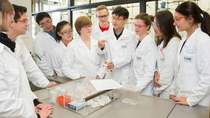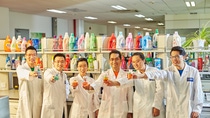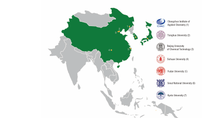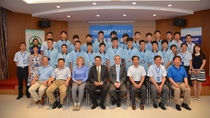Roots - Laboratory, laying a solid foundation
Cindy Deng starts her work at 8:30 a.m. at the Performance Polymers Lab. Most times, she conducts compounding and injection experiments according to the formulations designed by her lab leader, and analyzes their outcomes. Seemingly repeated and countless experiments actually will bring big value when they are turned into novel PBT-based solutions which are crucial to China’s auto industry. That, naturally, also ignites Cindy’s passion for work.
However, her daily routine as a chemist will soon be challenged by some “green hands” at the lab. As one of the five selected “training champions” for “Roots – Laboratory” program at Innovation Campus Asia Pacific (Shanghai), Cindy will have to spend half of her working time to coach new apprentices who are fresh college graduates.
“The ongoing expansion of our R&D facilities in Shanghai is bringing many opportunities to local students.”
Dr. Piyada Charoensirisomboon, Vice President, Innovation Campus Asia Pacific (Shanghai), BASF.
New comers
The “Roots – Laboratory” is a new R&D apprentice program to be kicked off in July 2015, aims to recruit qualified college graduates with chemistry background, and train them into reliable lab technicians through a 12-month program covering basic and specialization training. Cindy and her peers will guide the first 30 apprentices throughout the process from “green hands” to professionals.
“The ongoing expansion of our R&D facilities in Shanghai is bringing many opportunities to local students, and at the same time, challenges for us to recruit the best talents,” said Dr. Piyada Charoensirisomboon, Vice President, Innovation Campus Asia Pacific (Shanghai), BASF. “This means, we have to make more proactive efforts in attracting and developing the right people.”
While BASF is actively recruiting R&D scientists through new channels like Virtual Job Fair and NAO open innovation platform, “Roots – Laboratory” is one of the new approaches to build up a sustainable talent pipeline for ready and reliable employees for technical functions in labs.
Since the recruitment kick-off in June, the pilot program has aroused great interest among the target group. According to Eric Kang who works on recruitment for Innovation Campus, it has attracted more than 500 applicants from three colleges in Yangtze Delta area, while eventually close to 40 of them will be recruited as pre- apprentice interns.
“Every plant needs strong roots to absorb nutrition and to grow.”
Dr. Lars Reichmann, Vice President, Human Resources Greater China, BASF
Develop self and others
“Every plant needs strong roots to absorb nutrition and to grow. We name the new program as ‘Roots - Laboratory’ because we do hope this program enables young talent to develop strong roots for a successful career in our labs and to become an essential part of our growing R&D activities in China,” said Dr. Lars Reichmann, Vice President, Human Resources Greater China, BASF. “We want to recruit candidates with first ‘roots’ of basic chemistry knowledge, and enable them to learn more through further trainings within the company.”
Lisa Drahmann, project lead and training correspondent for Roots Laboratory, introduced that the 40 candidates will firstly go through six-month internship at BASF. Qualified ones will be officially recruited as apprentices who will continue to receive six-month general education in East China University of Science and Technology, and then spend another six months at different labs for specialization trainings.
“‘Roots – Laboratory’ shares the same philosophy as the well-renowned Apprentice Programs in the Ludwigshafen Headquarters – all candidates deliver comparably qualified jobs after theoretical and practical trainings,” said Reichmann. “We have made use of the long-term experience in training young lab technicians from our colleagues in Ludwigshafen as well as from our China experience to develop the new program.”

The program design considers the different educational system in China. It is tailored for the Chinese apprentices who have received most theoretical education at colleges or vocational school, offering one year additional training, while the German version covers also the basics in an overall three and half years training.
The training courses and assessment criteria of “Roots – Laboratory” are to be developed by the five training champions under guidance with experienced lab leaders and trainers both in Ludwigshafen and Shanghai. As part of the pre-training program, Cindy and her peers will spend two months in Germany in the central training department as well as in research units, during when they observe and practice how to teach apprentices, and take some deep dives in their specialized research areas. Meanwhile, training champions will work as a group on localized training plan for their own apprentices.
“I know it is very challenging, yet also makes a meaningful process of learning, sharing and contributing,” said Zeming Gao, one of training champions from dispersions lab. He joined BASF in 2013 after working as research assistant at Beijing Institute of Technology where he used to guide university students to conduct experiments. “I am very happy to be able to accompanying these apprentices and share what I have learnt contributing to their growth.”
“Training champions is one of the key success factors for this pilot program,” said Charoensirisomboon. “All the five trainers we have selected are very good lab technicians who are open and curious with potential intellectual capabilities. They will have the opportunity to development themselves and the others through teaching and mentoring.”
Like the other training champions, Lily Zhang also feels excited about her new role. She is one of the first lab technicians at Innovation Campus. “I have been accumulating my technical experiences during the past two years under the guidance of my lab leader and now I have this great opportunity to develop other skills which I believe is also important to my career.”
“We have a diversified team at Innovation Campus – our colleagues are from different cultural and educational backgrounds. It brings unique opportunities for mutual learning and development,” said Charoensirisomboon. “Roots – Laboratory program has further enriched our diversity, and contributed a new development module.”
BASF information: What is the development path for a lab technician? Is it separated with that of a scientist?
Dr. Piyada Charoensirisomboon: There are opportunities for everyone to develop themselves in the R&D community. For example, a previous lab technician at the research team, Innovation Campus, now works at a business unit on intellectual property topics; a scientist used to work on Engineering Plastics now works at Performance Materials, Product Development. There is no big differentiation between the path of technician and scientist. It depends pretty much on each individual’s personal will and their intellectual and learning capabilities.
Within the research team at Innovation Campus, we provide monthly ‘mini- lectures’ to lab technicians, on which occasion our scientists give lectures on materials science to help them develop in that direction. Another fact is that BASF provides financial supports to some qualified employees who want to get further education. Network for Advanced Materials Open Research is also an academic platform for them.
In the development of R&D staff, how can senior management contribute?
Dr. Lars Reichmann: Senior management can contribute in many different ways. For the new employees including fresh graduates, we shall ensure that practical training is helping them understand the way we work at BASF, and we can make ourselves available to answer their questions especially during onboarding months; for employees with longer working experience, we shall focus more on individual coaching to help them develop in specialized areas.
Later on we also have to support their development not only within our own departments. R&D staff as well as any other staff can learn a lot from new challenges on the job, supporting changes in the job scope and into new jobs after some year in the same position is also part of our job as senior management to support employee’s development and at the same time strengthen the talent pipeline for BASF as a whole.



